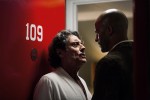Ancient gods and goddesses run rampant throughout the cities of America in the new Starz series “American Gods.”
The show, an adaption of Neil Gaiman’s 2001 novel of the same name, has expertly translated the text to the television screen by capturing the book’s magical and bizarre intricacies despite the show’s weak special effects. The third of eight episodes premiered Saturday.
The first episode of “American Gods” follows the recently released convict Shadow Moon (Ricky Whittle), whose wife Laura Moon (Emily Browning) has just died. On his flight home to Eagle Point, Indiana, a mysterious character, Mr. Wednesday (Ian McShane) offers him a job as his bodyguard, ushering Shadow into the sex-filled, blood-drenched world of ancient gods.
As a huge fan of the book’s interplay of multicultural mythology within a gritty American setting, I wanted the show to succeed, but I had a few trepidations – book-to-television projects rarely seem to result in anything worth watching. However, by the second episode, I found myself drawn back into the fantastical world first created by Gaiman.
Part of what makes the novel so engaging is its cast of unknown characters, who are slowly revealed to be otherworldly deities. The television show captures the mystery of the book perfectly – seemingly mortal characters like Slavic immigrant Czernobog (Peter Stormare) deliver lines almost directly from the novel. While making a bet with Shadow, Czernobog brings book lines to life, saying, “If I win, I get to knock your brains out. With the sledgehammer. First you go down on your knees. Then I hit you a blow with it, so you don’t get up again.”
His monologues imply a hidden past; he talks about the worship he enjoyed earlier in his life and his penchant for murdering cows. As a result, the show maintains an air of secrecy without revealing the divine status of its characters at the beginning, following the narrative of the book closely – something that other television adaptations sometimes fail to do.
Stormare’s acting performance communicates a nostalgia for the past in between deep drags of his cigarette and the throaty sounds of his maniacal laughs. He makes his character – an immortal being who once held great power but has since been reduced to soiled tank tops and checkers in a small Chicago apartment – believable.
The show’s dark lighting and high-contrast film style add to the cluttered apartment setting of Czernobog’s scenes, recreating the mental image I had when I first read about him in the book.
The show also doesn’t shy away from the book’s more explicit scenes, further capturing the drama of its predecessor. In the second episode, a middle-aged woman returns to her apartment with a date. After several minutes of foreplay, her carnivorous vagina engulfs her partner amid his sudden chanting and full-frontal orgasms, revealing her status as yet another unassuming immortal being.
The explicit sex scene, showcasing full nudity, is just one example of the show’s flirtation with shock. Blood and sex are everywhere, and the show’s embrace of these darker images adeptly translates the darker underside of the book to the television screen.
However, most important to the show is McShane’s role as Mr. Wednesday. Watching the show, it felt as if his one glittering eye had come directly from the pages of the book. McShane’s quick-witted banter and incessant aloofness embody the best aspects of Gaiman’s literary character.
If the show struggles anywhere, it is in its special effects. Although tricky camera angles and enriched colors help hide its technical deficits, a show about immortal beings is bound to require some advanced computer-generated imagery, and Starz clearly lacks the budget of networks like HBO, which can create full-sized, computer-generated dragons.
One scene, in which a mob hangs Shadow from a tree, features unrealistic graphics that seem right out of a Syfy original movie.
But the true strength of the show lies in its actors and in its dedication to its source material. TV’s “American Gods” brings ancient myths to life once again while paying homage to the literary genius of its novel predecessor.

I honestly think the slightly too bad to be real graphics in those scenes add more of a dream like feel for shadow as he progresses into the world of the gods, from initially not believing in Wednesday and Mad Sweeney about him plucking the coin from thin air to making it snow on a bright sunny day and accepting that as fact.